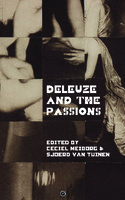Deleuze and the Passions
Contributor(s)
Meiborg, Ceciel (editor)
van Tuinen, Sjoerd (editor)
Collection
ScholarLed; Dutch Research Council (NWO)Language
EnglishAbstract
In recent years the humanities, social sciences and neuroscience have witnessed an ‘affective turn,’ especially in discourses around post-Fordist labor, economic and ecological crises, populism and identity politics, mental health, and political struggle. This new awareness would be unthinkable without the pioneering work of Gilles Deleuze, who replaced judgment with affect as the very material movement of thought: every concept is an affective experience, a becoming. Besides entirely active affects, the highest practice of thought, there is no thought without passive affects or passions. Instead of a calm and rational philosophy of passions, Deleuzian thought is therefore inseparable from “isolated and passionate cries” that deny what everybody knows and what nobody can deny: “every true thought is an aggression.” This inseparability of reason and passion is by no means an anti-intellectualist or irrationalist stance. Rather, it is critical, since it protects reason from its self-imposed stupidity (bêtise) by relating it to the unthought forces that condition it. And it is clinical, because thought becomes possessed by a power of selection. The purely active, i.e. free-floating, unrecorded desire, is never enough to produce a consistent relation to the future, which is why we need the passions to give us an initial orientation, to force and enable us to think. Passions are the beliefs, perceptions, representations, and opinions that attach us to the world; they make up the very material of which our lives and thoughts are composed.
Keywords
Gilles Deleuze; affect studies; philosophy; ontology; phenomenologyDOI
10.21983/P3.0161.1.00ISBN
9780998237541OCN
1048197358Publisher
punctum booksPublisher website
https://punctumbooks.com/Publication date and place
Brooklyn, NY, 2016Classification
Western philosophy from c 1800


 Download
Download